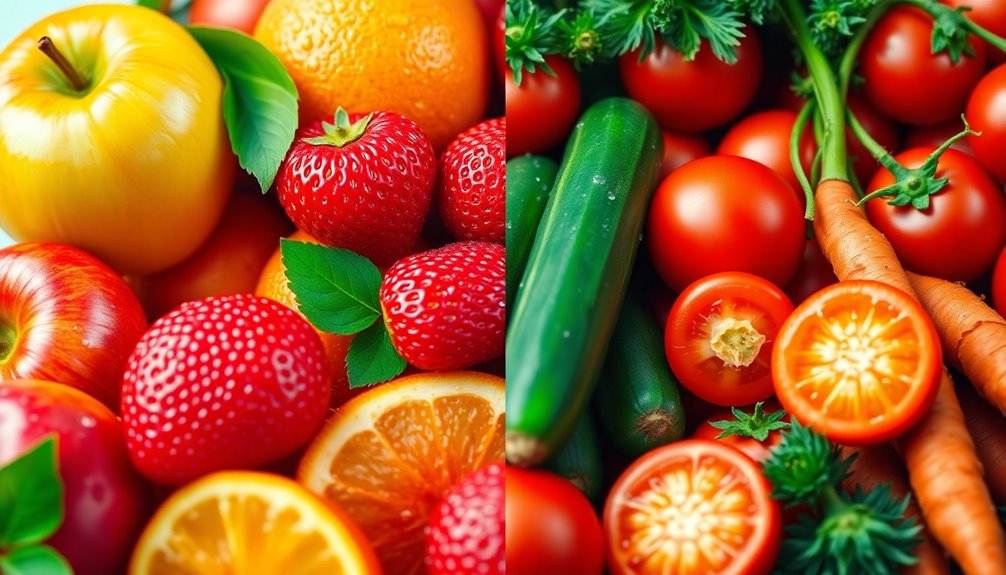Incorporating healthy fats into your diet is key for effective weight loss. Monounsaturated fats, like those in olive oil and avocados, help curb cravings and promote heart health. Polyunsaturated fats, found in fatty fish and walnuts, also support weight management and improve insulin sensitivity. These fats enhance satiety, making you feel full and satisfied with fewer calories. Aim for 20%-35% of your daily caloric intake from healthy fats while keeping saturated fats to a minimum. As you explore these delicious and nutritious options, you'll discover even more ways to boost your weight loss efforts.
Key Takeaways
- Healthy fats should comprise 20%-35% of daily calories, primarily from unsaturated sources like olive oil and avocados for effective weight management.
- Monounsaturated fats help regulate appetite and enhance feelings of fullness, supporting weight loss efforts.
- Polyunsaturated fats, particularly omega-3 fatty acids from fatty fish, improve heart health and insulin sensitivity, aiding weight management.
- Incorporating full-fat dairy, like Greek yogurt, can help control hunger while providing beneficial fats that support weight loss.
- Replacing unhealthy fats with healthy options lowers LDL cholesterol and reduces the risk of heart disease, promoting overall health during weight loss.
Understanding Healthy Fats

When it comes to nutrition, understanding healthy fats is fundamental for making informed dietary choices. Healthy fats, particularly unsaturated fats, should comprise 20%-35% of your total daily caloric intake, with less than 10% from saturated fats. This balance promotes heart health and supports weight loss efforts.
Monounsaturated fats, found in foods like avocados and olive oil, can improve your cholesterol levels and enhance feelings of fullness. By including these fats in your meals, you're less likely to overeat, helping you maintain a balanced diet.
On the other hand, polyunsaturated fats, especially omega-3 fatty acids from sources like fatty fish and flaxseed, are essential for overall health. Aim for at least two servings of these per week.
Recognizing the difference between healthy (unsaturated) and unhealthy (saturated and trans) fats is significant. By making better dietary choices, you not only boost your heart health but also aid your weight loss journey. Additionally, some healthy fats, like those in avocados and olive oil, can provide essential nutrients that support overall wellness.
Incorporating healthy fats can enhance your meals' satisfaction and satiety, supporting appetite regulation and making it easier to stick to your goals.
Types of Healthy Fats

When it comes to healthy fats, you'll want to focus on monounsaturated and polyunsaturated options. Monounsaturated fats, like those from olive oil and avocados, can help lower bad cholesterol levels. On the other hand, polyunsaturated fats, found in fatty fish and walnuts, offer essential omega-3 fatty acids that boost your overall health. Additionally, incorporating chia seeds into your diet can provide a rich source of omega-3s along with dietary fiber, supporting digestive health and weight management. Chia seeds are also beneficial for weight loss due to their ability to promote satiety and reduce overall calorie intake. These seeds are high in fiber, which can further aid in digestion and help maintain a healthy weight. Rich in essential minerals, chia seeds contribute to bone health and overall nutritional balance. Furthermore, using chia seeds in recipes can enhance gluten-free baking by providing moisture and binding properties, making them a versatile ingredient in your diet.
Monounsaturated Fat Benefits
Monounsaturated fats offer numerous benefits that can support your weight loss journey while promoting overall health. These healthy fats, found in foods like olive oil, avocados, nuts, and seeds, are known for improving heart health by lowering LDL cholesterol levels. Additionally, incorporating educational toys into your child's playtime can enhance their overall development, making them more focused and less distracted during meals. Furthermore, studies have shown that diets rich in antioxidants can combat oxidative stress, which is beneficial for overall wellness and weight management.
Research indicates that diets rich in raw fruits and vegetables can also complement a healthy lifestyle, further promoting weight loss and overall wellness. By incorporating monounsaturated fats into your diet, you can enhance feelings of fullness and satiety, which may help reduce overall calorie intake. Research shows that diets rich in monounsaturated fats, like the Mediterranean diet, lead to better weight management outcomes. Consuming foods high in these fats, such as avocados at breakfast, can suppress hunger, promoting better appetite regulation throughout the day. This means you'll likely find yourself less tempted to snack mindlessly, making it easier to stay on track with your weight loss goals.
Including sources of monounsaturated fats, like nuts and seeds, not only provides essential nutrients but also contributes to a balanced diet. Additionally, curiosity fosters social connections that can motivate you to stick to healthy eating habits by engaging with others on the same journey.
Polyunsaturated Fat Sources
Polyunsaturated fats are essential components of a healthy diet that can greatly impact your overall well-being and weight management.
These fats, particularly omega-3 fatty acids, play a crucial role in promoting heart health and reducing LDL cholesterol levels. Incorporating polyunsaturated fats into your meals can help you feel fuller longer, making it easier to manage your weight.
Here are some excellent sources of polyunsaturated fats you should consider adding to your diet:
- Fatty fish: Salmon and mackerel are packed with omega-3 fatty acids.
- Vegetable oils: Soybean, corn, and sunflower oil are great for cooking and dressings.
- Nuts and seeds: Walnuts and flaxseeds offer a plant-based source of these healthy fats.
- Chia seeds: These tiny seeds are loaded with omega-3s and fiber.
- Tofu: A versatile protein that also contains polyunsaturated fats.
Aim to consume at least two servings of fatty fish per week to support your heart health and reduce inflammation. Additionally, incorporating low-carb vegetables into your diet can further enhance the benefits of polyunsaturated fats by providing essential nutrients and fiber.
Benefits of Healthy Fats

When you include healthy fats in your diet, you're not just satisfying your hunger; you're also improving your heart health.
These fats help regulate your appetite, making it easier to manage your weight effectively.
Plus, by supporting your body's fat-burning processes, you can enjoy the benefits of feeling fuller for longer. Additionally, incorporating anti-inflammatory properties can further enhance your overall health and weight management efforts.
Improved Heart Health
Incorporating healthy fats into your diet can greatly improve your heart health. By choosing the right types of fats, you can lower your risk of heart disease and enhance your cardiovascular health.
Focus on these benefits of healthy fats:
- Lower LDL cholesterol: Unsaturated fats, found in avocados and olive oil, can help reduce harmful cholesterol levels.
- Omega-3 fatty acids: Eating fatty fish, like salmon, at least twice a week can markedly lower heart disease risk. This aligns with the idea of diversifying investments as a strategy for long-term stability.
- Monounsaturated fats: Nuts and seeds are packed with these fats, linked to improved cardiovascular health and lower blood pressure.
- Full-fat dairy: Regular consumption of full-fat options, like yogurt, may lower heart disease risk compared to low-fat products.
- Replacing unhealthy fats: Swapping saturated and trans fats for healthy fats can boost your heart health and decrease overall cardiovascular risks.
- Additionally, maintaining a diet rich in low carb foods can support your heart health while promoting weight loss.
Enhanced Weight Management
Healthy fats play an essential role in enhancing weight management and can often be the key to successful weight loss. By incorporating healthy fats into your diet, you can improve satiety and reduce overall calorie intake. For instance, foods rich in monounsaturated fats, like olive oil, not only taste great but also positively influence appetite regulation and cravings. Additionally, understanding your net worth can help you make informed decisions about your food choices and budget. Regular consumption of miniature horses can also provide a unique source of companionship that may encourage a more active lifestyle. The ketogenic diet, known for its emphasis on low-carb, high-fat foods, can further enhance the benefits of healthy fats for those looking to manage their weight effectively. In fact, incorporating keto-friendly ingredients can help ensure that your meals remain delicious and satisfying while supporting your weight loss journey.
Moreover, fatty fish, packed with omega-3 fatty acids, promote feelings of fullness and support metabolic health, making them a smart choice for weight management. Full-fat dairy products, such as yogurt, can also be beneficial. When consumed in moderation, they're linked to a lower risk of weight gain and better body composition. Additionally, incorporating regular physical activity can further enhance the effects of healthy fats on weight management.
Here's a quick overview of the benefits of healthy fats for weight loss:
| Healthy Fat Source | Benefits | Key Nutrients |
|---|---|---|
| Avocados | Enhances satiety | Monounsaturated fats |
| Olive Oil | Reduces cravings | Monounsaturated fats |
| Fatty Fish | Supports metabolic health | Omega-3 fatty acids |
| Full-Fat Dairy | Improves body composition | Calcium, fats |
Making the right choices can lead to better weight control and overall health.
Appetite Regulation Support
The role of healthy fats in appetite regulation is essential for effective weight management. By incorporating healthy fats into your diet, you can experience improved satiety and reduced hunger, which directly supports your weight loss efforts.
Here are some benefits of including healthy fats:
- Monounsaturated fats from sources like avocados and nuts help regulate appetite hormones. Additionally, these fats can enhance mood enhancement, making it easier to stick with a healthy eating plan.
- Omega-3 fatty acids found in fatty fish promote feelings of fullness after meals.
- Including full-fat dairy products, such as yogurt, can enhance appetite control over time.
- A diet high in healthy fats improves insulin sensitivity, stabilizing blood sugar levels. This stability can be further supported by maintaining positive energy to influence your eating choices.
- Consuming healthy fats leads to decreased overall calorie intake, making it easier to maintain a balanced diet.
- Additionally, healthy fats can contribute to mental clarity and overall cognitive function, which may enhance your motivation to stick to a weight loss plan.
Best Sources of Healthy Fats

What're the best sources of healthy fats you can include in your diet? Start by incorporating monounsaturated fats, which are found in avocados, olive oil, and nuts. These fats help improve cholesterol levels and promote heart health, making them ideal for weight loss. Additionally, herbal teas can be a great complement to a diet rich in healthy fats, as they offer various health benefits.
Next, consider polyunsaturated fats, especially omega-3 fatty acids from fatty fish like salmon and mackerel, along with flaxseeds. Aim for at least two servings of fatty fish each week to reduce inflammation and support overall health.
Don't overlook full-fat dairy products such as Greek yogurt. These can enhance satiety and are linked to a lower risk of weight gain over time, making them a beneficial addition to your weight loss diet.
You might also want to add chia seeds to your meals. They're nutrient-dense, high in fiber, and loaded with omega-3 fatty acids, which can assist in your weight loss efforts.
Lastly, treat yourself to some dark chocolate in moderation. It contains heart-healthy fats and antioxidants, providing a satisfying indulgence that can fit into a balanced diet.
Incorporating sources of healthy fats can also enhance your overall mental and emotional well-being, supporting a more holistic approach to personal development.
Embrace these sources of healthy fats to support your weight loss journey!
Impact on Weight Loss

Incorporating healthy fats into your diet can considerably impact your weight loss efforts. These fats can help you feel fuller and more satisfied, reducing the likelihood of overeating.
Here are some key benefits of including healthy fats in your meals:
- Promotes satiety: Healthy fats like those in avocados and nuts keep you feeling full longer.
- Improves insulin sensitivity: Unsaturated fats found in olive oil and fatty fish can enhance your body's ability to manage blood sugar.
- Supports appetite regulation: Healthy fats, especially omega-3 fatty acids, help regulate hormones that control hunger.
- Reduces hunger levels: Studies show that meals with moderate healthy fats lead to less craving and improved weight loss.
- Full-fat dairy benefits: Incorporating full-fat dairy products, such as yogurt, is linked to better body composition and lower weight gain risk.
Risks of Unhealthy Fats

Many people underestimate the risks of unhealthy fats, which can have serious consequences for your health. Consuming saturated and trans fats can lead to elevated LDL cholesterol levels, increasing your risk of heart disease and other cardiovascular diseases. These unhealthy fats are commonly found in baked goods, fried foods, and processed snacks.
To help you understand the impact of various fats, here's a quick comparison:
| Type of Fat | Sources | Health Risks |
|---|---|---|
| Saturated Fats | Butter, cheese, red meat | Increased LDL cholesterol, risk of heart disease |
| Trans Fats | Fried foods, margarine | Increased risk of diabetes, obesity, and certain cancers |
| Healthy Fats | Avocados, nuts, olive oil | Support heart health, lower cholesterol |
The American Heart Association recommends limiting trans fat intake to less than 2 grams per day. Being aware of the types of fats you consume is essential for maintaining a healthy lifestyle. Regularly eating unhealthy fats can lead to chronic diseases, so make informed choices to protect your health.
Incorporating Fats Into Your Diet

Healthy fats can play an essential role in your diet, helping you feel fuller and more satisfied while supporting your weight loss goals. By incorporating healthy fats into your meals, you can enhance satiety and minimize calorie intake.
Here are some easy ways to include them:
- Add avocados to your salads or smoothies for a creamy texture and a boost of monounsaturated fats.
- Drizzle olive oil on your vegetables or use it for cooking to replace saturated fats with healthier options.
- Incorporate full-fat yogurt into your breakfast or snacks; its protein and fat content can help keep hunger at bay.
- Enjoy fatty fish like salmon at least twice a week, packed with omega-3 fatty acids to support heart health and weight management.
- Sprinkle chia seeds or flaxseeds on your oatmeal or yogurt for added fiber and healthy fats that aid in appetite regulation.
Healthy Fats for Meal Prep

When it comes to meal prep, adding healthy fats can greatly enhance both the flavor and nutritional value of your dishes. Incorporating ingredients like olive oil, nuts, and avocado not only boosts taste but also improves satiety, making it easier for you to stick to your weight loss goals.
Don't forget about fatty fish like salmon and mackerel! These are rich in omega-3 fatty acids, which are fantastic for heart health and help you feel fuller longer.
For snacks or smoothies, full-fat yogurt is an excellent choice, as it provides probiotics and higher protein content, regulating your appetite effectively.
Consider adding chia seeds or flaxseeds to your meal prep recipes. They're packed with fiber and omega-3s, supporting healthy digestion and promoting a sense of fullness that aids in weight loss.
Lastly, when prepping salads, opt for full-fat dressings that contain healthy fats. This not only enhances flavor but also aids in the absorption of fat-soluble vitamins (A, D, E, K), enriching your healthy diet.
Embracing these healthy fats in your meal prep can make a significant difference in your weight loss journey!
Professional Guidance on Fats

Incorporating healthy fats into your diet can be greatly enhanced with professional guidance. Consulting a registered dietitian can give you personalized advice tailored to your weight loss goals.
They help you understand the right balance of dietary fats, suggesting that 20%-35% of your total calories should come from healthy fats, particularly unsaturated fats that promote heart health.
Here are some key benefits of professional guidance:
- Identify the best sources of monounsaturated and polyunsaturated fats.
- Learn to limit saturated and trans fats for better health outcomes.
- Get strategies for managing portion sizes and food choices.
- Understand how healthy fats can enhance satiety without leading to overeating.
- Receive ongoing motivation and accountability to stay on track.
Staying Motivated in Your Journey

Staying motivated in your weight loss journey is all about setting achievable goals and celebrating those small wins along the way.
Joining a supportive community can provide the encouragement you need to stay on track.
Set Achievable Goals
Setting achievable goals is essential for keeping your motivation high during your weight loss journey. By setting specific, measurable, attainable, relevant, and time-bound (SMART) goals, you'll be better equipped to track your progress and stay focused.
Incorporating healthy fats into your diet can help you reach your caloric goals while keeping you satisfied. Here are some tips to help you on this journey:
- Define your weight loss target: Set a realistic amount to lose each week.
- Incorporate healthy fats: Add avocados or nuts to meals for sustained fullness.
- Create a food diary: Regularly monitor your intake of healthy fats and other foods.
- Join a support network: Engage with communities focused on healthy eating for motivation.
- Track your progress: Regularly review your goals and adjust them as needed.
Celebrate Small Wins
Celebrating small wins can be a game-changer in your weight loss journey. When you incorporate healthy fats like avocados or nuts into your meals, recognize it as a victory. Each time you lose even 1-2 pounds, take a moment to celebrate that progress. Research shows that acknowledging these minor achievements can greatly increase your long-term success rates.
Tracking your progress and celebrating milestones—like sticking to your healthy eating plan for a week—enhances your commitment to dietary goals. Positive reinforcement from these small victories, such as fitting into a favorite pair of jeans or feeling more energetic, fuels your motivation. This approach helps you stay focused and inspired.
Engaging in self-reflection to recognize and celebrate your progress, no matter how minor, fosters a positive mindset. It builds resilience during challenging moments in your weight loss efforts.
By celebrating small wins, you create a rewarding cycle that encourages you to continue making healthier choices. Remember, every step counts in your journey, and these small celebrations can lead to considerable transformations over time.
Join Supportive Communities
Joining supportive communities can greatly boost your motivation and accountability on your weight loss journey. When you connect with others who share similar goals, you can encourage each other to make positive dietary choices, particularly when it comes to incorporating healthy fats into your meals.
Here are some benefits of joining these communities:
- Access to valuable resources like meal plans and healthy fat recipes.
- Opportunities to share experiences and strategies that support weight loss.
- Participation in community activities that reinforce commitment to your goals.
- A sense of belonging that fosters long-term success in weight management.
- Regular updates on the latest research about healthy fats and weight loss.
Being part of a supportive group not only enhances your motivation but also creates a network of accountability. You'll find that those who engage with others tend to experience greater success in their weight loss efforts compared to those who go it alone.
Frequently Asked Questions
What Are the Best Fats to Lose Weight?
When you're looking to lose weight, incorporating healthy fats can make a real difference.
Focus on monounsaturated fats from sources like avocados and olive oil, as they help you feel full.
Polyunsaturated fats, especially omega-3s from fatty fish, can boost fat burning.
Don't overlook full-fat dairy, which may promote satiety.
Finally, enjoying nuts in moderation can support appetite regulation.
These fats not only nourish you but also enhance your weight loss journey.
What Fat Goes Away First When Losing Weight?
Did you know that around 50% of your initial weight loss often comes from visceral fat?
When you start losing weight, your body tends to target visceral fat first, which surrounds your internal organs. This happens because it's more metabolically active and easier for your body to mobilize.
After that, you'll likely notice a reduction in subcutaneous fat, as your caloric deficit and increased activity continue to influence your fat loss journey.
What Sheds the Most Fat?
When you're looking to shed the most fat, focus on a balanced approach that combines a calorie deficit with regular exercise.
High-intensity interval training (HIIT) can be particularly effective, as it boosts your metabolism and burns calories even after your workout.
Incorporating strength training helps build muscle, which increases your resting metabolic rate.
Don't forget about your diet—eating whole foods and staying hydrated can support your fat loss journey considerably.
What Kind of Fat Burns Fat?
Imagine your body as a well-tuned engine, and the right kind of fat is high-quality fuel.
You'll want to focus on unsaturated fats, like those in avocados and olive oil. These fats can help regulate your appetite and enhance your metabolic efficiency.
Also, don't forget about omega-3s from fatty fish; they ignite your fat-burning potential.
Conclusion
Incorporating healthy fats into your diet is like adding a secret ingredient to your favorite recipe—it elevates everything! By understanding the types of fats, their benefits, and the best sources, you can effectively support your weight loss journey. Embrace these nutritious fats, and watch your meals transform into satisfying, flavorful dishes. Remember, it's not just about cutting calories; it's about nourishing your body. So, plunge into and enjoy the journey to a healthier you!










